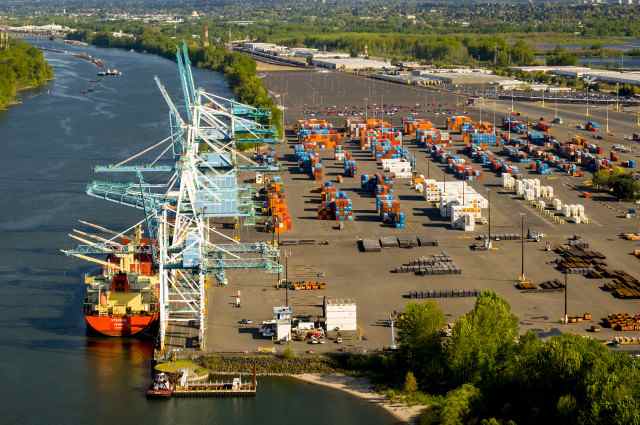forum
library
tutorial
contact

Bill Would Allow Governors
to End Port Slowdowns
by Joseph Gallivan
Capital Press, August 7, 2015
|
the film forum library tutorial contact |

|
Bill Would Allow Governors
by Joseph Gallivan
|
 A bill aimed at preventing massive disruptions of trade at U.S. ports, like the slow downs at West Coast ports last winter, has been introduced in the House. It's a companion to one introduced in the Senate two months ago.
A bill aimed at preventing massive disruptions of trade at U.S. ports, like the slow downs at West Coast ports last winter, has been introduced in the House. It's a companion to one introduced in the Senate two months ago.
A bill allowing governors of seaport states and territories to invoke the Taft-Hartley Act to order dock workers to work has been introduced in the U.S. House by legislators from Washington, Colorado and American Samoa.
H.R. 3398, introduced Aug. 5, is a companion measure to S. 1519 introduced June 5 by Sens. Cory Gardner, R-Colo., and Lamar Alexander, R-Tenn. The Senate bill has been referred to the Committee on Health, Education, Labor and Pensions.
The House bill is sponsored by Reps. Dan Newhouse and Dave Reichert, both of Washington; Mike Coffman, of Colorado; and Aumua Amata Coleman Radewagen, of American Samoa. All four are Republicans.
The House and Senate bills are known as the Protecting Orderly and Responsible Transit of Shipment (PORTS) Act. They are in reaction to a May 2014 through February 2015 work slow down at 29 West Coast ports during contract negotiations between the International Longshore and Warehouse Union and the Pacific Maritime Association.
Losses to the U.S. economy from the slow down cost up to $2.5 billion per day and contributed an anemic 0.2 percent annual growth rate in the first quarter of 2015, Sen. John Thune, R-S.D., has said.
On May 12, Thune introduced S. 1298 to collect metrics of port marine terminal productivity for an early warning system to know when terminals are no longer operating normally.
Exports of imports of many commodities through the West Coast were impacted, including agricultural exports of apples, pears, hay, chilled beef and pork, frozen and dehydrated potato products, frozen vegetables, forest products, Christmas trees, citrus fruit, nuts and rice.
The slow down ended when an agreement for a new contract was reached in February. It took a couple more months for ports to rebuild normal flows.
"While the parties ultimately came to an agreement, the process took far too long and the damage to our economy was far too great," the sponsors of the House bill said.
Under Taft-Hartley, the president may appoint a board of inquiry to study disputes of threatened or actual strikes or lockouts affecting trade among states and foreign nations that if permitted to occur would imperil national health or safety. Upon a report by the board, the president may direct the attorney general to petition a court of jurisdiction to end a strike or lockout.
The PORTS Act expands that to include slow downs and gives the governors of impacted states or territories authority to appoint boards of inquiry and petition courts for injunctions if the president does not act within 10 days of receiving a request.
The House bill directs the U.S. comptroller general to study the economic impact of the recent slow down, review attempts at federal mediation, identify steps that could have been taken sooner and determine what legislative changes would result in more timely intervention.
Chris Schlect, president of the Northwest Horticultural Council in Yakima, Wash., said he's pleased the bills have been introduced but doubts they will work because of labor union dominance in California, Oregon and Washington.
"It's just not right that some 20,000 labor people can essentially hold up a huge amount of the American economy over their individual work issues," Schlect said. "We all recognize they need to be paid fairly but their economic clout is way out of line from economic reality."
learn more on topics covered in the film
see the video
read the script
learn the songs
discussion forum
